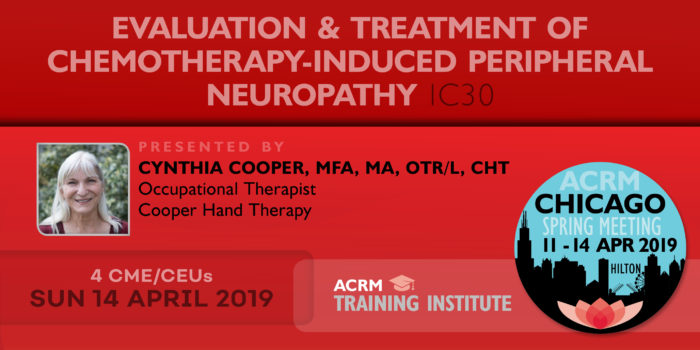Cynthia Cooper will present a half-day instructional course on the evaluation and treatment of chemotherapy-induced peripheral neuropathy at the ACRM Training Institute in Chicago on Sunday, 14 April.
Ms. Cooper has practiced hand therapy for 39 years and published chapters in numerous hand therapy and occupational therapy textbooks and journals. She is the editor of Fundamentals of Hand Therapy: Clinical Reasoning and Treatment Guidelines for Common Diagnoses of the Upper Extremity.
Q: What is the primary purpose of your course?
A: The primary purpose is to define and describe chemotherapy-induced peripheral neuropathy (CIPN), to explain its clinical presentation and implications to function and quality of life, and to present a program for evaluating and treating CIPN of the hands and feet. Strategies for prevention of CIPN will be included. This course will be interactive and attendees will participate in the gentle exercises and hands-on techniques that are demonstrated.
Q: What experience or research inspired you to pursue this topic?
A: I am an occupational therapist specialized in hand therapy. I have always been interested in sensation and sensory problems. I have treated a lot of people with CIPN and I feel that some of the sensory problems associated with CIPN are compounded by inactivity, poor posture, and subclinical edema. I recognized that the traditional rehabilitation for CIPN tends to focus on compensatory strategies rather than targeting the health of peripheral nerves or the neuromuscular system. I have extrapolated from evidence-based research in hand surgery and hand therapy to develop a program for CIPN that targets the sensorimotor system to promote peripheral nerve health through breathing, postural awareness, gentle pain-free motion, light pleasant manual therapy as appropriate, and sensory rehabilitation.
Q: What new skills or knowledge should participants expect to bring back to their team/practice?
A: Attendees will return with an understanding of CIPN including:
- The chemotherapy drugs most associated with CIPN, the typical clinical presentation, the typical timeline of symptoms, and an appreciation of concepts of neuroplasticity as they relate to this intervention program
- Suggestions for evaluation of CIPN including specific sensory testing recommendations that are quick and informative techniques, screening of posture, joint mobility, musculotendinous tightness, and neural mobility
- Treatment recommendations including breathing, postural training, active range of motion, gentle pain-free tendon and nerve glides, edema management, light pleasant manual therapy techniques that can be taught to patients’ significant others, and sensory rehabilitation.









